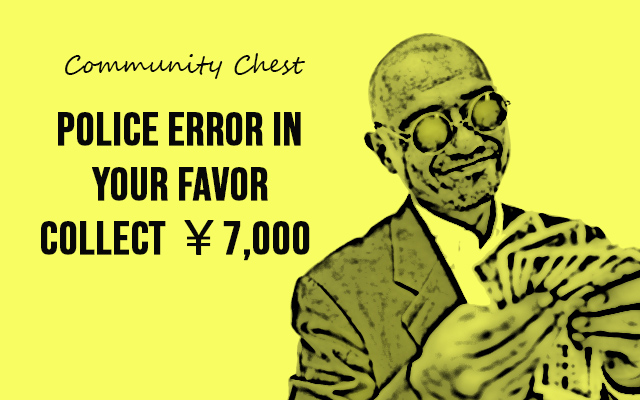
It’s the kind of news you only read about in Monopoly.
Japan can be a tricky place to drive in, and in fact sometimes even the people responsible for issuing and enforcing the rules of the road can sometimes get confused.
For example, let’s take a look at this intersection here in Seto City, Aichi Prefecture.
It’s a bit of a mess. For starters, you have a main city road and a prefectural highway intersecting at a very sharp angle. On top of that the highway becomes one-way on the south side of the intersection, and just to make things extra convoluted there’s a tiny conduit between the highway and the main road, creating an A shape, but that little strip of road is only one-way too.
So let’s say someone is driving towards the intersection from the angle seen below, and they want to turn right onto the highway. They can’t use the small conduit because it’s one-way in the opposite direction, so is it possible to make the very sharp right turn at the main intersection?
Earlier this year, one officer with the Aichi Prefectural Police said “no” and applied for a sign to be installed prohibiting right turns. In August of this year an official sign indicating that traffic could only go left or straight was hung, and for good measure another larger and less formal sign was set up underneath notifying drivers that right turns were not allowed in large print, really driving the point home.
▼ A news report showing the sign
Since then, a total of 168 tickets were handed out to motorists who dared to turn right anyway. It wasn’t until November that another officer with the Traffic Control Division noticed the signs and that they were a mistake.
The general rule is that at intersections between city streets and highways, cars should be allowed to access the highway from a right turn. The particular orientation of this intersection apparently was not a factor, and as a result, the signs were immediately removed.
As for the 168 people who received tickets, the Aichi Prefectural Police officially apologized and promised to both cancel the demerit points and refund all fines, totaling 1.14 million yen (US$10,100).
However, this creates a kind of ethically nebulous situation in which readers of the news were largely divided about who to point the finger at.
“It never occurred to me that some traffic signs might be wrong.”
“So technically didn’t the police violate a traffic rule? We should give them a ticket.”
“What about the people who suffered more from the tickets, like those who got their licenses revoked? How are they compensated?”
“Even if the rule was mistaken, the drivers still knowingly disobeyed the sign though.”
“I wonder if the police officers handing out tickets took a moment to consider if the sign was correct.”
“Those demerit points affect people’s insurance. Does that all go away too?”
“I would be furious if I got a ticket for that.”
“But they did ignore a sign telling them not to turn right.”
Whether this is more a matter of reckless driving or police negligence probably boils down to each individual case, so it would seem the Aichi Police are choosing to settle everything in one fell swoop regardless of the circumstances.
Nevertheless, anyone who’s ever gotten a ticket would agree the last thing you’d expect is to get a full refund and apology for it. That’s about as likely as winning second place in a beauty contest or getting a bank error in your favor.
Source: NHK via Hachima Kiko
Top image: Pakutaso (Edited by SoraNews24)
● Want to hear about SoraNews24’s latest articles as soon as they’re published? Follow us on Facebook and Twitter!

 Japanese police department publishes “driving horoscopes” to encourage road safety
Japanese police department publishes “driving horoscopes” to encourage road safety People wowed by Japanese road signs that change automatically in seconds 【Videos】
People wowed by Japanese road signs that change automatically in seconds 【Videos】 Japanese police reminding drivers not to perform the illegal “Ibaraki Dash” maneuver
Japanese police reminding drivers not to perform the illegal “Ibaraki Dash” maneuver Japan worried about its aging population… of traffic lights
Japan worried about its aging population… of traffic lights Police to ticket cyclists riding on sidewalks, which amounts to almost all cyclists in Japan
Police to ticket cyclists riding on sidewalks, which amounts to almost all cyclists in Japan Starbucks Japan unveils new sakura cherry blossom collection for hanami season 2026
Starbucks Japan unveils new sakura cherry blossom collection for hanami season 2026 Taste-testing Japan’s real-world Dragon Balls and Senzu Beans at Marugame Seimen
Taste-testing Japan’s real-world Dragon Balls and Senzu Beans at Marugame Seimen Live-action One Piece’s Luffy teaches Sesame Street’s Elmo a Japanese word for friendship[Video]
Live-action One Piece’s Luffy teaches Sesame Street’s Elmo a Japanese word for friendship[Video] One Piece creator has hidden secret of anime treasure’s identity in chest at bottom of real-world ocean
One Piece creator has hidden secret of anime treasure’s identity in chest at bottom of real-world ocean Is Tokyo Station’s startlingly expensive wagyu bento boxed lunch worth its high price?[Taste test]
Is Tokyo Station’s startlingly expensive wagyu bento boxed lunch worth its high price?[Taste test] Japan’s first hotel with a human washing machine is now ready for you to come and bathe in it
Japan’s first hotel with a human washing machine is now ready for you to come and bathe in it Ghibli releases a Howl’s Moving Castle that walks and lights up【Video】
Ghibli releases a Howl’s Moving Castle that walks and lights up【Video】 Mr. Sato tries to eat a cheap beef bowl, gets a massive, luxurious surprise in the process
Mr. Sato tries to eat a cheap beef bowl, gets a massive, luxurious surprise in the process Japan’s cherry blossom season predicted to start earlier than we’d thought, especially in Tokyo
Japan’s cherry blossom season predicted to start earlier than we’d thought, especially in Tokyo Studio Ghibli adds more magic to its Kiki’s Delivery Service collection
Studio Ghibli adds more magic to its Kiki’s Delivery Service collection Starbucks Japan releases first-ever Hinamatsuri Girls’ Day Frappuccino
Starbucks Japan releases first-ever Hinamatsuri Girls’ Day Frappuccino Japanese restaurant chain serves Dragon Ball donuts and Senzu Beans this spring
Japanese restaurant chain serves Dragon Ball donuts and Senzu Beans this spring Japan Extreme Budget Travel! A trip from Tokyo to Izumo for just 30,000 yen [Part 2]
Japan Extreme Budget Travel! A trip from Tokyo to Izumo for just 30,000 yen [Part 2] Japan’s craziest burger chain takes menchi katsu to new extreme levels
Japan’s craziest burger chain takes menchi katsu to new extreme levels Sakura Festival in Chiyoda mixes illuminations, boats, music, and Rilakkuma in the heart of Tokyo
Sakura Festival in Chiyoda mixes illuminations, boats, music, and Rilakkuma in the heart of Tokyo Viral Japanese cheesecake from Osaka has a lesser known rival called Aunt Wanda
Viral Japanese cheesecake from Osaka has a lesser known rival called Aunt Wanda Japan’s newest Shinkansen has no seats…or passengers [Video]
Japan’s newest Shinkansen has no seats…or passengers [Video] Starbucks Japan releases new sakura goods and drinkware for cherry blossom season 2026
Starbucks Japan releases new sakura goods and drinkware for cherry blossom season 2026 Foreigners accounting for over 80 percent of off-course skiers needing rescue in Japan’s Hokkaido
Foreigners accounting for over 80 percent of off-course skiers needing rescue in Japan’s Hokkaido Super-salty pizza sends six kids to the hospital in Japan, linguistics blamed
Super-salty pizza sends six kids to the hospital in Japan, linguistics blamed Starbucks Japan unveils new sakura Frappuccino for cherry blossom season 2026
Starbucks Japan unveils new sakura Frappuccino for cherry blossom season 2026 Foreign tourists in Japan will get free Shinkansen tickets to promote regional tourism
Foreign tourists in Japan will get free Shinkansen tickets to promote regional tourism The 10 most annoying things foreign tourists do on Japanese trains, according to locals
The 10 most annoying things foreign tourists do on Japanese trains, according to locals Take a trip to Japan’s Dododo Land, the most irritating place on Earth
Take a trip to Japan’s Dododo Land, the most irritating place on Earth Naruto and Converse team up for new line of shinobi sneakers[Photos]
Naruto and Converse team up for new line of shinobi sneakers[Photos] Survey asks foreign tourists what bothered them in Japan, more than half gave same answer
Survey asks foreign tourists what bothered them in Japan, more than half gave same answer Japan’s human washing machines will go on sale to general public, demos to be held in Tokyo
Japan’s human washing machines will go on sale to general public, demos to be held in Tokyo Starbucks Japan releases new drinkware and goods for Valentine’s Day
Starbucks Japan releases new drinkware and goods for Valentine’s Day We deeply regret going into this tunnel on our walk in the mountains of Japan
We deeply regret going into this tunnel on our walk in the mountains of Japan Studio Ghibli releases Kodama forest spirits from Princess Mononoke to light up your home
Studio Ghibli releases Kodama forest spirits from Princess Mononoke to light up your home Major Japanese hotel chain says reservations via overseas booking sites may not be valid
Major Japanese hotel chain says reservations via overseas booking sites may not be valid Put sesame oil in your coffee? Japanese maker says it’s the best way to start your day【Taste test】
Put sesame oil in your coffee? Japanese maker says it’s the best way to start your day【Taste test】 No more using real katana for tourism activities, Japan’s National Police Agency says
No more using real katana for tourism activities, Japan’s National Police Agency says Japanese youths anger police by sitting at kotatsu table at busy Kyoto intersection【Video】
Japanese youths anger police by sitting at kotatsu table at busy Kyoto intersection【Video】 Over 2,000 Saitama residents to get refunds from the police for “erroneously” issued tickets
Over 2,000 Saitama residents to get refunds from the police for “erroneously” issued tickets AirTag planted on Aichi Prefectural Police car, by someone who doesn’t understand cars well
AirTag planted on Aichi Prefectural Police car, by someone who doesn’t understand cars well Man who stole two packs of ground beef tracked by police for about 1,000 kilometers across Japan
Man who stole two packs of ground beef tracked by police for about 1,000 kilometers across Japan Himakajima: The Japanese island with one traffic light that only turns green once a year
Himakajima: The Japanese island with one traffic light that only turns green once a year Japanese netizens confused by sign that boasts “on-the-spot change back with any cash purchase”
Japanese netizens confused by sign that boasts “on-the-spot change back with any cash purchase” Aichi Police: Surrender your driver’s license and get up to $1 off at McDonald’s!
Aichi Police: Surrender your driver’s license and get up to $1 off at McDonald’s! “Conbini warp” an increasing traffic problem for businesses and authorities across Japan
“Conbini warp” an increasing traffic problem for businesses and authorities across Japan Getting a driver’s license in Japan the hard way: The End
Getting a driver’s license in Japan the hard way: The End Getting a driver’s license in Japan the hard way — Part 5: The second written test
Getting a driver’s license in Japan the hard way — Part 5: The second written test Getting a driver’s license in Japan the hard way: The first driving test a few more times
Getting a driver’s license in Japan the hard way: The first driving test a few more times